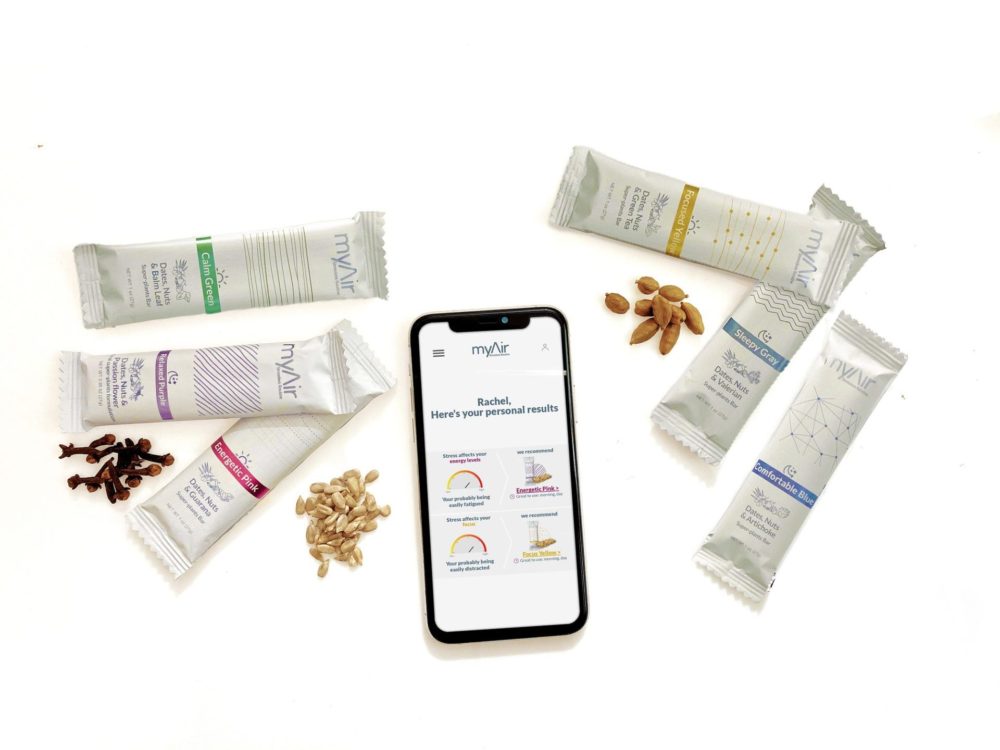With the Covid-19 pandemic looming over lives and livelihoods, the World Health Organization has been warning for months that “substantial investment” will be needed to ward off a “mental health crisis.”
Some major food companies seem to be heeding that call. PepsiCo has invested all with what it knows best: a new drink. This “sleep-aid” is called Driftwell, and it contains two active ingredients — L-theanine and magnesium — that are said to help with maintaining sleep.
Stressed? Have a snack!
However, this is just one sip of some of the anti-stress foodtech innovation at play. In the startup world, there is also a bevvy of personalized nutrition companies designing their own products to ward off stress.
One launch this week came from Israeli startup MyAir. It unveiled a new range of plant-based nutrition bars, each containing a “botanical blend” of fruits, nuts, herbs, cereals, and even hops. The proprietary herbal extract blends are “tailored to the consumer’s unique stress profile and cognitive needs” using “deep profiling machine learning technology,” according to the startup.
To do this, the MyAir team developed an algorithm based on physiological and psychological data, which is gathered from would-be customers via an online questionnaire. Further physiological responses to stress, including alterations in heart rate, respiration, sleep quality, and physical activity, are also tracked using smart watches.
The algorithm can process these datasets to customize a combination of MyAir bars for each customer’s needs. These personalized combinations are available through a subscription service and delivered monthly to their doorstep.
Snacking-as-a-service
Getting this off the ground has involved a $2 million pre-seed investment from Tel-Aviv University’s TAU Ventures, iAngels VC, and Entrée Capital.
For MyAir founder and co-CEO Rachel Yarcony, the decision to tackle the ‘Covid blues’ — and everyday stress more generally — came after she took stock of her own stress levels while working in executive roles at Nestlé and Strauss Group.
She told AFN how commonplace methods aimed at relaxation are not enough to stay calm in today’s hectic world – and neither are a reliance on pharmaceutical drugs.
“Studies show that 75% of the population prefers to improve their quality of life by embracing a healthy diet rather than dosing up on prescribed medication,” she said. “Meanwhile 73% of adults snack in order to relax. Our concept effectively leverages AI technology to provide a simple-to-follow, tasty, customized nutritional solution to the global stress crisis.”
Stressful as invoking a global stress crisis may sound, it does appear there’s a long-term problem brewing. Even before Covid-19 hit, stress had long been considered a factor in the leading causes of death globally. According to the American Institute of Stress, 83% of US workers suffer from work-related stress.
“Stress has many facets,” Dovev Goldstein, MyAir’s other co-CEO, told AFN. “In our preliminary study […] we discovered that different consumers generally have different stress symptoms that are more dominant than the others.”
Giving an example, Dovev explained that stress mainly affects him in the mornings, leading to decreased energy levels and focus in the early part of the day. But his partner feels more stressed at night, leading to problems getting a fulfilling sleep.
“Each of us needs a personalized solution. This is where MyAir has redefined the paradigm,” he said.
A GPS for personalized nutrition
There are plenty of other startups working around the concept of managing stress through diet. One is California-based Mealshare, a “mindful eating app” largely aimed at mothers to help them gain expert nutritional advice for themselves and their families.
Sweden’s Lifesum monitors calorie intake, exercise, and nutritional information to generate personalized health plans. For Oviva, there’s a niche to explore in social networks for digital therapy, bringing together patients and dieticians via its platform. Oviva’s app implies a good deal of trust in patients admitting to that extra muffin, with self-recording of eating habits, weight, and exercise. A potential upsell here is in advisory services and tailored meal plans.
Microbiome analysis startup Nusantics scored seed funding earlier this year to bring personalized nutrition to Indonesia. Read more here
Another notable wellbeing startup called Zoe has made an interesting pivot of late; founded as a spinout from King’s College London in 2017, it has been offering personalized dietary recommendations based on analysis of the microbiome in someone’s gut, along with genomic data. When Covid-19 struck, the team developed a symptom tracker app which racked up a million downloads in a matter of weeks.
For Goldstein, we’re only just beginning to see the potential of how technologies like AI and data analytics can lead to personalized nutrition that can revolutionize our diets and improve our mental health.
“Driving to a new location was challenging 10 years ago. You’d have to either memorize directions or print out a paper map,” he said.
“Today, hardly anyone drives to a new location without using a GPS. That’s exactly what the future holds for our diets. I believe that in five years, AI technology will influence the food we eat in the same way GPS controls our navigation.”
Know of any foodtech snacking stories? Send them over to [email protected]





